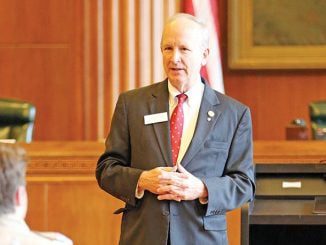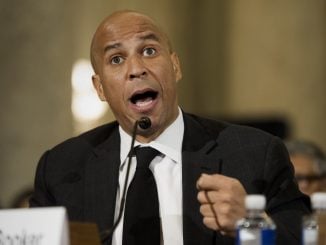
RALEIGH — He witnessed the Berlin Wall going up, but as a candidate running for State Superintendent of Public Instruction, Rep. Craig Horn (R-Union) hopes to bring some walls down in North Carolina.
“I have a track record of bringing people with disparate opinions together and focusing on things we can accomplish rather than dwelling on things,” said Horn.
When he joined the Air Force, Horn said his goal was to be trained as an electronics technician but after leaving the military he ended up as a hot dog salesman for Oscar Meyer. Later on in his career, Horn was a food broker before retiring to North Carolina in 2007 to chase his grandkids for a while.
“I certainly never intended to be a North Carolina legislator,” said Horn. “That was never on my radar screen until I got here and started volunteering in schools.”
Horn married his wife Lorraine 42 years ago and the couple has four adult children; each with two from previous marriages. They also have seven grandchildren. He explained that he had served with his wife’s husband, who had died suddenly of an aneurysm.
“He was a Bulgarian linguist and I was a Russian linguist and we worked together on Warsaw Pact issues while stationed in Turkey, which is when we met and the kids first met each other,” said Horn.
Horn has served five terms in the North Carolina House, the majority of which he served as the Chair of both the influential House K-12 Education and Education Appropriations Committees. Now, Horn said he wants to act on that experience and that he’s “done with the bickering” on education from all sides.
“We spent so much time throwing each other under the bus, we spend so much time listening to object rather than listening to learn,” Horn said.
In order to end the bickering, Horn believes he can bring people together and hopefully get them to commit to a vision of where the state should be now and where it should be headed in the future.
“Diversity doesn’t have to be divisive,” according to Horn, but says “we’ve allowed it to become that way.”
“Unfortunately, we’ve allowed it because it’s become more about power and money than it has become about outcomes for kids,” Horn said. “So those are that’s the reason I’m running.”
“I don’t automatically assume that for me to win, you have to lose. Nor do I assume that for you to win, I have to lose. I don’t make that assumption,” said Horn. “That’s unfortunately how a lot of people seem to think that that’s the way it works.”
When it comes to key priorities, Horn said that literacy is “first and foremost” on his agenda and that includes improving how teachers are taught to teach reading. He also believes that while students should be able to read by the end of third grade, the goal should really be much earlier – by the end of first grade.
When asked about the state’s K-3 literacy program, Read To Achieve, Horn said that he believed it is a “great program,” but that it needs “more help” and more reading coaches involved.
Horn is interested in finding ways to engage parents and guardians, which is fundamental to a child’s academic success and that, as a state, we must “up the game” for not just teachers, but also for parents.
Dealing with parents, students and school officials is just part of the job. Another part is interacting with the State Board of Education, with which current Supt. Mark Johnson has had some adversarial dealings that included being sued by the board early in his tenure.
“Mark Johnson inherited a culture that went in one direction. He brought a culture that went in another. That makes things difficult,” said Horn.
In working with the State Board, Horn said he’d meet with each one of them individually and later as a group to identify issues where there could be “immediate agreement” and see what they could agree on for the long-term.
“Let’s work on those things, but let’s not beat each other over the head with it,” Horn said.
Across the county and in North Carolina, few topics have created as wide a difference of opinion as school choice.
“I believe that the person with the best interests of the child in mind are their parents or their family,” said Horn, adding that he is a firm believer in school choice.
“I know that the title of the position is Superintendent of Public Instruction, not Superintendent public schools,” said Horn. “And I note that in our Constitution, we have a requirement to provide what has become known as a ‘sound basic education’ for every child. It does not say that every child must go to a traditional public school.”
From the charter system to traditional public schools, Horn says that there is something to be learned and applied. He also said that in order to turn around the 400 lowest-performing schools in the state, incentives have to play a role.
“Incentivize our best teachers to take on the toughest projects and principals to take on the toughest schools,” Horn said.
Horn explained that quality staff and principals often don’t want to go to a low performing school where, at least early on, they will most likely incur low-performance ratings.
“Well, then it impacts your bonus program. That’s a negative incentive. We can’t do that. We’ve got to change that,” said Horn.
Horn will face Catherine Truitt, the current Chancellor of Western Governor’s University, in the Primary on March Tuesday, March 3. If a clear primary winner is determined, they will face the Democrat candidate in general election will be held on Nov.


